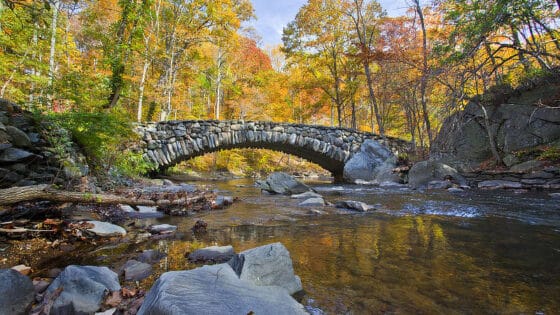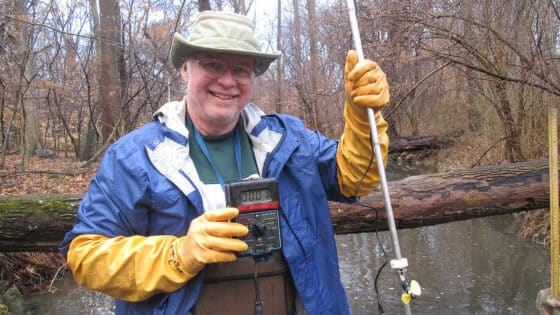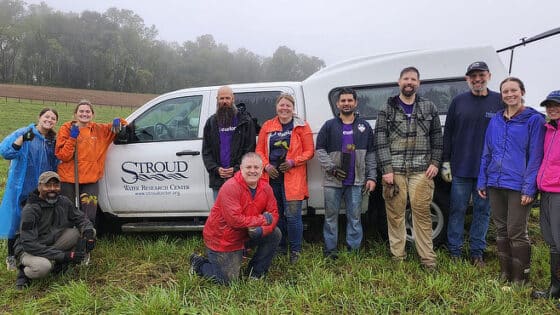STROUD CENTER SCIENTISTS ATTEND INTERNATIONAL CONFERENCES

In May, Stroud Center scientists attended the first ever Joint Aquatic Sciences Meeting, co-sponsored by four leading aquatic scientific societies. Held in Portland, Or., and attended by more than 3,500 water professionals, the meeting was a critical venue for Stroud scientists to share their scientific finds and network with colleagues.
Stroud’s biogeochemist, Louis Kaplan, Ph.D., delivered two lectures on work with Post Doctoral Associate Jen Mosher, Ph.D.: The Diversity of Dissolved Organic Matter: Chemical Composition Declines Along a River Continuum and Placing Microbial Communities Within the River Continuum.
Meshing nicely with the meeting theme of Bridging Genes to Ecosystems: Aquatic Science At a Time of Rapid Change, Stroud’s fish molecular ecologist William Eldridge, Ph.D., presented work on detecting freshwater mussels using an environmental DNA sensing approach. Stroud scientists Drs. Bernard Sweeney, John Jackson and David Arscott were also in attendance.

In August, Dr. Jinjun Kan attended the 15th International Symposium on Microbial Ecology in Seoul, Korea where he shared results from research conducted as part of the Christina River Basin Critical Zone Observatory, with contributions from Stroud scientists Drs. Charles Dow and Anthony Aufdenkampe and University of Delaware colleagues, Drs. Clara Chan and Olesya Lazareva.
LEAF PACK NETWORK SCIENCE HITS THE ROAD
Stroud scientists and educators have had a busy summer communicating the use and value of the Stroud Center’s Leaf Pack Stream Experiment Kit and monitoring protocol to a wide array of audiences.
- In May, Dr. Bernard Sweeney and Stroud Educator, Tara Muenz, hosted a leaf pack workshop at the River Network and Waterkeeper Alliance’s annual River Rally in Pittsburgh, Pa. After an inspiring introduction by Robert F. Kennedy Jr., Sweeney and Muenz presented “Model My Watershed®: A New Tool for Riverkeepers” to introduce River Rally participants to the Stroud Center’s innovative and intuitive web-based hydrologic model.
- In June, Muenz and Stroud entomologist Kerry Mapes provided a Leaf Pack mini-course for Donegal Trout Unlimited and Lancaster County Conservancy members.
- Also in June, Dr. Sweeney traveled to Peru to lead community workshops at several towns from Cusco to Quincemil to Puerto Maldonado on “Assessing the level of water pollution in streams using the Stroud Center’s Leaf Pack Experiment Kit.” The trip was made possible by support from the National Geographic Society and by logistical support from the Amazon Center for Environmental Education and Research (Therany Gonzales) and from the National University of San Marcos (Ana Huamantinco).
24 HOURS, 55 VOLUNTEERS, 807 SPECIES
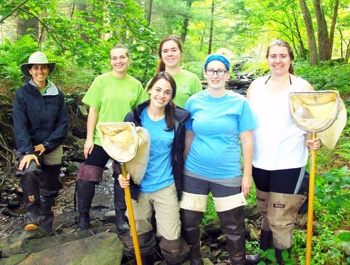
In June, Stroud Center sent a team to the second annual Upper Delaware BioBlitz in Sullivan County, Pa.
In a bioblitz, scientists, naturalists and other volunteers attempt to catalog as many living species as possible within a designated area in a short period of time, usually 24 hours.
The Stroud team, including education programs manager Tara Muenz, entomologist Kerry Mapes and entomology interns Maddie Chura, Amanda Johnston, Kelly McIntyre and Caroline Murphy helped sample and identify aquatic macroinvertebrates.
The final tally: 807 species (47 macroinvertebrate) including many that had not been previously identified in the county.
“It was great to be able to document the wide variety of species at this site because it demonstrates that it’s an area worthy of continued protection and conservation,” said Mapes. “The BioBlitz is a great opportunity to teach the public about the importance of biodiversity and for them to see the creatures they may not have even realized were there.”
Learn more about the BioBlitz in The Catskill Chronicle, view photos on our Facebook page, or watch a BioBlitz video.
WALKING THE WALK AT SPRING CREEK FARMS FIELD DAY
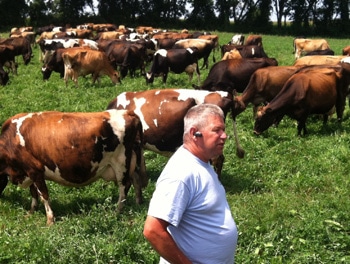
In August, Stroud Water Research Center and Berks County Conservation District held a Best Management Walk and Talk Session at Spring Creek Farms, an organic dairy farm in Heidelberg Township owned by Forrest and Barbara Stricker, and son Greg Stricker.
The farm was chosen for its diversity of Best Management Practices (BMPs) including streambank fencing, windrow composting, an animal heavy use area, a traveling irrigation system, and mob grazing.
During the walk Lamonte Garber, Stroud’s Watershed Restoration Coordinator, explained that the most beneficial way to manage a farm’s streams is to grow a forested buffer at least 35 feet wide on each side of the stream. In addition to filtering runoff from the land, the trees will widen the stream, making it shallower, slowing it down and boosting the ability of the macroinvertebrates, beneficial bacteria and other organisms in the stream to remove pollutants from the water.
The collaboration between the Berks County Conservation District and the Stroud Center is one of many strategic partnerships that will advance watershed restoration and farm economics in the region.
CULTIVATING THE NEXT GENERATION OF SCIENTISTS
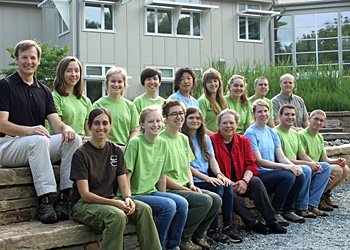
This summer, Stroud Water Research Center and The Pennsylvania State University showed 11 undergraduates and four K-12 teachers the real nuts and bolts of what it takes to conduct scientific research.
The Critical Zone Observatory Research Experience for Undergraduates and Teachers (CZO REU/RET) program is an educational outreach effort of the National Science Foundation’s CZO project, which brings together interdisciplinary teams of scientists to study the earth’s outer skin at observatories with distinct climates, rocks, soils and plants.
Students and teachers from across the nation were selected to conduct research at Stroud Center, University of Delaware and Penn State University. They began with a two-week orientation, visiting the Christina River Basin and Susquehanna Shale Hill CZOs.
Working with CZO scientists, they gained a breadth of hands-on knowledge that enabled them to pursue six-week research projects and, finally, to present their findings at a scientific conference.

